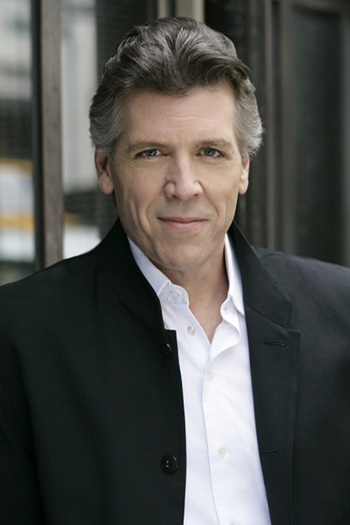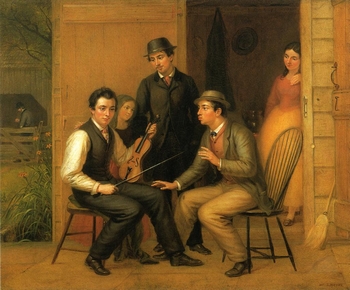Hampson and Rutenberg take audience on memorable journey through American song

In addition to being one of our most versatile and intelligent singers, equally at home in the opera house and recital hall, Thomas Hampson has long been a pioneer in bridging the world of performance and technology. His interactive website was around before most people owned home computers and he continues to be in the forefront of internet-based arts initiatives.
If you missed the wide-ranging recital of American song Hampson and pianist Craig Rutenberg presented at Ravinia Thursday night, have no fear. The program is available free through Instant Encore. (Go to Hampson’s page on the site and put in the code TH2009RAV.)
High-tech projects apart, no singer before the public has done more for the cause of homegrown vocal music than Hampson. The American baritone’s Ravinia program drew in large part from his new CD, Wondrous Free, showing how rich, variegated, and often downright strange our vocal heritage is —an apt reflection of the nation itself.
Hampson’s resonant baritone remains in fine repair and he sang with great power and expressive subtlety Thursday without any sense of strain, clearly—as he mentioned—enjoying the open, natural acoustic of the Martin Theatre.
Hampson’s advocacy of Stephen Foster has done much to cement the composer’s standing as the first great American song-writer (and Hampson’s 1992 disc, American Dreamer, is still the finest single Foster recording around). The singer’s gift is to present this repertoire with completely honest expression, taking each song on its own terms. His light romantic touch in Foster’s Open, Thy Lattice, Love, and an encore of Beautiful Dreamer was floated with just the right lilt and romantic intimacy. Foster’s haunting Hard Times seems more relevant than ever these days, and received a deeply felt rendering.
Copland’s The Dodger and The Boatman’s Dance were given lively and boisterous readings, spiced by Hampson adding a ripe Yankee twang. Charles Ives’ songs lack the immediate melodic appeal of Copland and Foster, often starting out in rustic manner, before veering off into typically Ivesian weirdness. Hampson and Rutenberg provided uninhibited renditions of Ives’ cowboy ode/monologue Charlie Rutlage, the bizarrely repetitive Circus Band, and the dissonant, declamatory Lincoln, the Great Commoner. Hampson capped the first half with a lovely ruminative rendering of Leonard Bernstein’s To What You Said, the composer’s most open artistic statement of his sexuality.

Yet, as often with Hampson’s recitals, it was the discoveries and rarely heard pieces—eleven of them Ravinia premieres—that proved most intriguing. The two songs that made up a Lincoln set with the Ives proved small gems. William Neidlinger’s Whitman setting, Memories of Lincoln, proved extraordinarily evocative, given an ardent, beautifully sustained performance by singer and pianist. Michael Daugherty’s Letter to Mrs. Bixby sets Lincoln’s consoling words with a simple straightforward eloquence worthy of the Great Emancipator and received a heartfelt yet unsentimental reading.
Other discoveries abounded such as a pair of atmospheric shipwreck songs by Griffes and MacDowell, and Henry T. Burleigh’s Ethiopia Saluting the Colors. Paul Bowles’ Blue Mountain Ballads were delivered with great character by Hampson, Rutenberg bringing out the flavorful honky-tonk piano and blues elements. Sidney Homer’s General William Booth is an extended piece of Transcendentalist religiosity, performed with ardent expression and not a hint of postmodern irony by Hampson. And Shenandoah, one of our most indelible folk melodies, received a hearty and impassioned performance.
If you missed Thursday’s recital go over to Instant Encore for the download. The free cost is certainly attractive, though the standard of artistry served up by Hampson and Rutenberg is beyond any price, and, in this repertoire, without peer.
Posted in Performances


